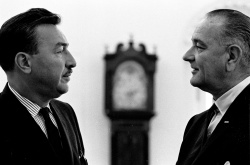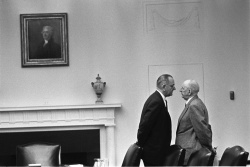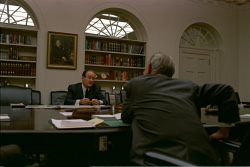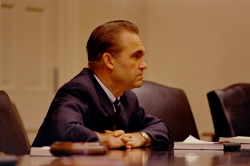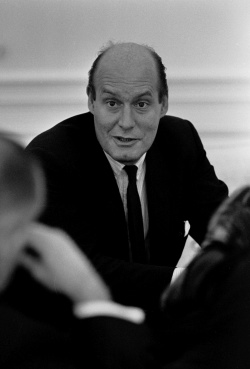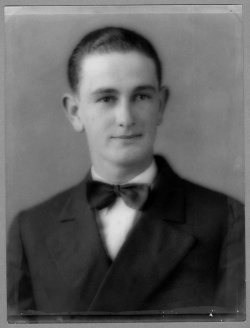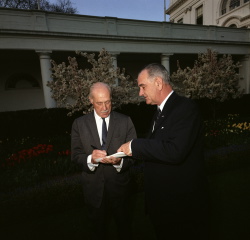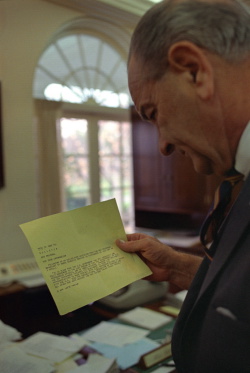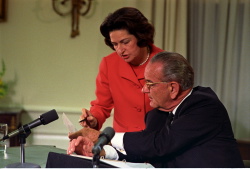1st2nd3rd4th5th6th7th8th9th10th11th12th13th14th15th16th17th18th19th20th21st22nd23rd24th25th26th27th28th29th30th31st
March 1st
On this day in 1968, President Johnson made remarks as he visited the NASA Manned Spacecraft Center in Houston, Texas.
“This new institute is a center of research that is designed specifically for the age of space. Here will come the scientists—and their students—from all corners of the world.
…
“This new Houston Lunar Science Institute will provide new means of communication and research for the world’s entire scientific community. It will help unite the nations for the great challenge of space.”
On this day in 1965, President Johnson had a telephone conversation with Congressman Adam Clayton Powell. Presidential Aide Jack Valenti also participated in the conversation.
In the conversation: Powell objected to an Appalachia Bill provision allowing the Commerce Department to change education programs; the two men discussed the Supreme Court decision on de facto school segregation; LBJ chastised Powell for delays on the Elementary and Secondary Education Bill.
On this day in 1965, President Johnson spoke to the National Conference on Educational Legislation regarding current legislation before Congress.
“Nothing matters more to the future of our country. Not our military preparedness—we spend over 50 billion a year for that; armed power is worthless if we lack the brain power to build a world of peace. Not our productive economy, for we cannot sustain growth without trained manpower. Not our democratic system of government, for freedom is fragile if citizens are ignorant.”
March 2nd
On this day in 1967, President Johnson spoke on the phone with Senator Richard Russell.
They discussed Senator Robert F. Kennedy’s Senate speech proposing a bombing halt to bring about Vietnam peace negotiations; past U. S. bombing pauses, peace efforts; LBJ’s messages to Ho Chi Minh; Harold Wilson-Alexsei Kosygin peace effort; and the background of the 37-day bombing pause.
On this day in 1967, President Johnson spoke at a ceremony marking the 100th anniversary of Howard University in Washington, D.C.
“For the work that lies ahead is demanding, and it involves far too many lives in urgent need of help, to be parceled out by race. Tomorrow’s problems, which will be placed squarely in your hands, will not be divided into ‘Negro problems’ and ‘White problems.’ There will be only human problems, and there will be more than enough to go around.
“I said at the beginning that this day is for prayers of thanksgiving—for remembrance and wonder.
“Our prayers are to the God who has strengthened the will of a grateful people. Our remembrance is of those who created and sustained this great university, and brought here thousands of young men and women from all over the world, and gave them the power to serve their fellow man.
“Our wonder—our very great wonder—is for the human spirit that, having endured infinite wrongs, can yet hold to its faith in the dignity of life.
“For one hundred years that spirit has prevailed here at Howard University. May it always prevail.”
March 3rd
On this day in 1966, President Johnson signed the “Cold War G.I. Bill,” called the Veterans Readjustment Benefits Act of 1966. This G.I. Bill provided a permanent program of educational assistance, home and farm loans, hospitalization and medical care, job counseling and placement services, federal job preference, and other benefits to veterans who served after January 31, 1955.
March 4th
On this day in 1965, President Johnson proclaimed the month of April 1965 as Cancer Control Month.
March 5th
On this day in 1966, President Johnson’s memorandum establishing a task force on Summer Domestic Programs was released. LBJ wrote,
I would expect this task force to: (a) identify and describe problems that are likely to arise next summer, (b) indicate appropriate action which should be taken to alleviate such problems, and (c) indicate how such action might best be implemented. In this connection, I would expect the task force to consider not only the most efficient use of Federal resources in combating such problems, but also how best to enlist the support of other public and private organizations. The potential problems to be considered by the task force should embrace the full range of domestic social concern, including employment, education, recreation, health, community relations, etc.”
On this day in 1967, President Johnson’s memorandum “Economic Planning for the End of Vietnam Hostilities” was released. LBJ wrote,
As I indicated in my Economic Report, I am directing the relevant agencies in the Executive Branch to begin at once a major and coordinated effort to review our readiness to make the economic adjustments which a termination of hostilities in Vietnam might require.
March 6th
On this day in 1965, President Johnson had a telephone conversation with Vice-President Hubert Humphrey.
In the conversation: LBJ emphasized the need to pass Education, Medicare, and Appalachias bills; they discussed Protestant objections to the Education Bill; the Vice-President’s role as liaison to Congress; the “(Board of) Education”; LBJ’s meetings with business, labor, and Martin Luther King, Jr.; and literacy training for Negroes.
On this day in 1965, President Johnson had a telephone conversation with Defense Secretary Robert McNamara.
The President and Secretary McNamara discussed the decision to send Marines to Danang. LBJ read part of a McGeorge Bundy memo on possible peace talks and the United Kingdom’s views on Vietnam. They talked about a New York Times story on possible negotiations based on Secretary of State Dean Rusk’s briefing. Other topics included the psychological impact of sending Marines and Senator Mike Mansfield.
On this day in 1968, President Johnson gave a special message to the Congress on the problems of the American Indian: “The Forgotten American.”
The American Indian, once proud and free, is torn now between White and tribal values; between the politics and language of the White man and his own historic culture. His problems, sharpened by years of defeat and exploitation, neglect and inadequate effort, will take many years to overcome.
But recent landmark laws—the Economic Opportunity Act, the Elementary and Secondary Education Act, the Manpower Development and Training Act—have given us an opportunity to deal with the persistent problems of the American Indian. The time has come to focus our efforts on the plight of the American Indian through these and the other laws passed in the last few years.
…
I propose a new goal for our Indian programs: A goal that ends the old debate about ‘termination’ of Indian programs and stresses self-determination; a goal that erases old attitudes of paternalism and promotes partnership self-help.
Our goal must be:
—A standard of living for the Indians equal to that of the country as a whole.
—Freedom of Choice: An opportunity to remain in their homelands, if they choose, without surrendering their dignity; an opportunity to move to the towns and cities of America, if they choose, equipped with the skills to live in equality and dignity.
—Full participation in the life of modern America, with a full share of economic opportunity and social justice.
On this day in 1966, President Johnson made a statement upon announcing the selection of a task force on the health and education needs of the people of South Vietnam.
“The United States has a twofold objective in Vietnam: not only to help the Republic of Vietnam win its war against aggression, but also to lay the groundwork for meaningful and durable peace.
“The members of this mission will bring professional competence to the work of the health and education task force. This can only be the beginning of what must be a continuing effort on the part of both governments to give new promise and new purpose to the lives of the Vietnamese people.”
March 7th
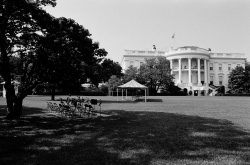 Preparations for Head of State Visit (King Bhumibol Adulyadej and Queen Sirikit of Thailand) June 27, 1967
Preparations for Head of State Visit (King Bhumibol Adulyadej and Queen Sirikit of Thailand) June 27, 1967credit: Kevin Smith
On this day in 1964, President Johnson signed Executive Order 11145 providing for a Curator of the White House and establishing a Committee for the Preservation of the White House.
WHEREAS the White House, as the home of the highest elective officer of the United States
—symbolizes the American ideal of responsible self-government
—is emblematic of our democracy and our national purpose
—has been intimately associated with the personal and social life of the Presidents of the United States and many of their official acts
—occupies a particular place in the heart of every American citizen, andWHEREAS certain historic rooms and entranceways in the White House
—possess great human interest and historic significance
—traditionally have been open to visitors
—have provided pleasure and patriotic inspiration to millions of our citizens
—have come to be regarded as a public museum and the proud possession of all Americans…
March 8th
On this day in 1965, President Johnson had a telephone conversation with Buford Ellington, former Governor of Tennessee and a Democratic leader.
LBJ asked Ellington’s advice on the situation in Selma, Alabama, and asked him to meet with Governor George Wallace and Nicholas Katzenbach; Ellington agreed to a meeting; LBJ discussed ideas for alleviating the situation in Alabama; they talked about a possible court order; the two men discussed local mediation.
On this day in 1965, President Johnson had a telephone conversation with Lister Hill, U. S. Senator from Alabama.
LBJ asked Hill’s advice on the Selma, Alabama situation; they talked about Governor George Wallace’s action in University of Alabama desegregation; they discussed Katzenbach as a possible friend of court in Martin Luther King, Jr.’s suit; the two men talked about LBJ’s recent meeting with Martin Luther King, Jr.; public safety concerns were discussed; they mentioned LeRoy Collins as a possible mediator.
On this day in 1968, President Johnson gave a statement on the Conservation Message.
This is the work of the new conservation. It can be the new strength of America. I sent Congress today an action program:
—An action program that will fight pollution that fouls the air we all breathe and blights our rivers and our streams.
—An action program to continue the great work which now enables 120 million Americans to reach a national park or lakeshore or camping area in just an afternoon’s drive from the crowded city.
—An action program to make every community a place of pride for its people.Now the question is for each of us: What kind of America do we really want to live in—and what kind of America do we want to leave to our children?
So I call upon all Americans—every mother and father, every businessman and worker, every Governor and every mayor-to join us in this urgent task of conserving America the beautiful.
The statement that LBJ gave was also recorded for radio and television broadcasts.
On this day in 1967, President Johnson wrote a letter concerning the progress report by the Federal Woman’s Award Study Group.
As a Nation, we cannot continue to afford through outmoded custom or attitude the senseless waste of the capability potential of American women. It is my firm intent, and I have expressed this many times since I became President, to have the Federal service truly exemplify equal opportunity for all in employment and advancement regardless of race, color, creed, national origin or sex. I am confident that the work of the Study Group will continue to contribute to the attainment of this objective.
On this day in 1966, President Johnson wrote a memorandum on balance of payments and federal expenditures overseas.
Our balance of payments requires our continuing attention and concern. We achieved a substantial improvement in the overall deficit in 1965 and we look forward to further improvement this year.
March 9th
On this day in 1965, President Johnson issued a statement on the situation in Selma, Alabama. On March 7th, known as “Bloody Sunday,” Civil rights leaders marched to the Edmund Pettus Bridge but were beaten and driven back to Selma.
“Ever since the events of Sunday afternoon in Selma, Ala., the administration has been in close touch with the situation and has made every effort to prevent a repetition. I am certain Americans everywhere join in deploring the brutality with which a number of Negro citizens of Alabama were treated when they sought to dramatize their deep and sincere interest in attaining the precious right to vote.
The best legal talent in the Federal Government is engaged in preparing legislation which will secure that right for every American. I expect to complete work on my recommendations by this weekend and shall dispatch a special message to Congress as soon as the drafting of the legislation is finished.
Federal officials have been sent to Selma and are supplying up-to-the-minute reports on developments there.
The Federal District Court in Alabama has before it a request to enjoin State officials from interfering with the right of Alabama citizens to walk from Selma to Montgomery in order to focus attention on their efforts to secure the right to register and vote. I have directed the Justice Department to enter the case as a ‘friend of the court’ so that it can present its recommendations and otherwise assist the court in every manner in resolving the legal issues involved in the case.
We will continue our efforts to work with the individuals involved to relieve tensions and to make it possible for every citizen to vote. I urge all who are in positions of leadership and capable of influencing the conduct of others to approach this tense situation with calmness, reasonableness, and respect for law and order.
On this day in 1965, President Johnson had a telephone conversation with Special Assistant Bill Moyers.
In the conversation, Moyers reported on his talk with Martin Luther King, Jr. on events planned for that day in Selma, Alabama. The two men discussed Governor George Wallace’s promise to maintain order; the question of calling out the National Guard; court proceedings; Martin Luther King, Jr.’s fears for his life; and the current federal presence in Selma.
On this day in 1965, President Johnson signed the Appalachia Bill. LBJ said,
“We have much in Appalachia. The area is larger than all but one of the 48 contiguous States (a State which modesty impells me not to identify by name). Only two States of the Union have larger populations. Yet, the nearly 17 million Appalachian residents, more numerous than residents of New England or the farm States or the mountain States, lag far behind in their participation in our prosperity.
…
“America today has many responsibilities, more diverse, more far flung, more vital to all mankind than any other nation has ever in history willingly assumed. Wherever we have our commitments, whether to the old and the strong or to the young and the weak, we shall match our words with deeds. But we recognize realistically that our strength abroad rests upon our strength at home, and that is why we must and we do labor in unity to perform together tasks that have been too long neglected in every region east and west, north and south.”
March 10th
On this day in 1965, President Johnson issued a statement on the proposed National Foundation on the Arts and Humanities.
The humanities are an effort to explore the nature of man’s culture and to deepen understanding of the sources and goals of human activity. Our recommendations recognize this effort as a central part of the American national purpose, and provide modest support to those whose work offers promise of extending the boundaries of understanding.
Pursuit of artistic achievement, and making the fruits of that achievement available to all its people, is also among the hallmarks of a Great Society.
We fully recognize that no government can call artistic excellence into existence. It must flow from the quality of the society and the good fortune of the Nation. Nor should any government seek to restrict the freedom of the artist to pursue his calling in his own way. Freedom is an essential condition for the artist, and in proportion as freedom is diminished so is the prospect of artistic achievement.
But government can seek to create conditions under which the arts can flourish; through recognition of achievements, through helping those who seek to enlarge creative understanding, through increasing the access of our people to the works of our artists, and through recognizing the arts as part of the pursuit of American greatness. That is the goal of this legislation.
In so doing we follow the example of many other nations where government sympathy and support have helped to shape great and influential artistic traditions.
On this day in 1966, President Johnson wrote a letter to the President of the Senate and to the Speaker of the House Proposing the establishment of an American Revolution Bicentennial Commission.
It is fitting to plan now for the two hundredth anniversary of these events. In the rich diversity that is America, each community will celebrate in its own way and will draw its own inspiration from the Revolution. But the Federal Government must be prepared to share its knowledge and resources with states, local communities, historical societies, and others across the Nation. The Bicentennial Celebration should be a truly national effort.
I propose that we establish an American Revolution Bicentennial Commission, composed of members of Congress and the Executive Branch and distinguished and outstanding Americans appointed by the President.
This Commission will:
—Provide a creative and helping hand to State, local, and private groups in their commemorations;
—Increase our knowledge and appreciation of the American Revolution through our schools and universities and our historians and scholars;
—Plan for celebrations at the national level;
—Recall to America and to the world the majestic significance of the Revolution.
On this day in 1967, President Johnson presented the Presidential Unit Citation for its service in Vietnam to the 3d Aerospace Rescue and Recovery Group, Military Airlift Command in a ceremony at the White House. LBJ said,
“Your place of honor was not earned without great sacrifice.
“Seven members of this group have given their lives. Fourteen members are already listed as missing. Two have been captured. All of them have devotion and dedication to the spirit of the Third’s motto, ‘That Others May Live.’
“As President of all the people of this country, I am very proud to pay tribute with this citation. It is not a banner and it is not used in a picket line, but it is recognition of the gallant men of the Third Aerospace Recovery Group.
“Your courage and your self-sacrifice have provided us with a glowing example of what I believe is the best of American manhood. You are a credit to a grateful Nation.
“If there is any gratitude in the Nation, if there is any recognition in the Nation, if there is any honor and pride in the Nation, it ought to go to men like you, because there is not any greater honor than is represented by that uniform and these flags.”
March 11th
On this day in 1965, President Johnson met with the National Newspaper Publishers Association and a group of Negro publishers in the Cabinet Room about the situation in Selma, Alabama. At a White House reception that evening for members of Congress, the President spoke on the situation in Selma and asked Attorney General Nicholas Katzenbach to brief the Congressmen. Bureau of the Budget Director Kermit Gordon also briefed the Congressmen on the budget, and Secretary of Defense Robert McNamara spoke on the Defense budget and the situation in Vietnam.
During the reception, an aide handed the President a note informing him that the Reverend James Reeb, a white minister from Boston who had been beaten the previous day in Selma by four white men, had died in a Birmingham hospital. Johnson left the reception to telephone Reeb’s wife and father and returned after talking to them.
March 12th
On this day in 1968, President Johnson narrowly defeated anti-war candidate Senator Eugene McCarthy in the New Hampshire Democratic presidential primary.
On this day in 1965, President Johnson issued proclamation 3644 naming March 16, 1965, Goddard Day.
“WHEREAS on March 16, 1926, Dr. Robert Hutchings Goddard successfully launched the world's first liquid-fuel rocket at Auburn, Massachusetts; and
WHEREAS this achievement, as well as Dr. Goddard's other pioneering achievements in the theory, construction, and testing of rockets, established a foundation for the development of modern rocketry and made possible the exploration of space; and
WHEREAS it is appropriate that the great scientific accomplishments of Dr. Goddard should be remembered and that they should be memorialized on the anniversary of his success; and
WHEREAS the Congress, by an Act approved March 12, 1965, has designated March 16, 1965, as Goddard Day and has requested the President to issue a proclamation calling upon officials of the Government and the public to participate in ceremonies, meetings, and other activities held in observance of Goddard Day:
NOW, THEREFORE, I, LYNDON B. JOHNSON, President of the United States of America, do hereby call upon officials of the Government, and the people, of the United States, to observe March 16, 1965, with ceremonies and activities designed to commemorate the achievements of Dr. Robert H. Goddard.”
On this day in 1960, Senator Johnson received the AMVETS Silver Helmet Defense Award at a luncheon honoring him and Richard Nixon.
March 13th
On this day in 1965, President Johnson and Alabama Governor George Wallace met for several hours. Their discussion focused on whether or not Johnson would send in federal troops to protect the civil rights marchers in Selma, Alabama. In the afternoon, Johnson held a press conference where he made a statement on the situation in Selma and answered questions about his meeting with Governor Wallace.
March 14th
On this day in 1965, President Johnson called a bi-partisan meeting of Congressional leaders and other officials to discuss the provisions of the Voting Rights Bill.
On this day in 1967, President Johnson met with Prime Minister Il Kwon Chung of Korea at the White House.
On this day in 1968, President Johnson met with Prime Minister Mohamed Ibrahim Egal of Somalia at the White House.
March 15th
On this day in 1965, President Johnson addressed a joint session of Congress with “The American Promise” speech (Voting Rights Message), urging voting rights legislation. In his address to the unusual night session of Congress, which was televised, he said,
“What happened in Selma is part of a far larger movement which reaches into every section and state of America. It is the effort of American Negroes to secure for themselves the full blessings of American life. Their cause must be our cause, too, because it’s not just Negroes but, really, it’s all of us who must overcome the crippling legacy of bigotry and injustice.”
In his address, he included the rallying slogan of the civil rights movement: “And we shall overcome.”
March 16th
On this day in 1966, President Johnson issued a statement following the safe return of Gemini 8 astronauts Neil Armstrong and David Scott.
THE ADMINISTRATOR of NASA, Mr. James Webb, has informed me that Neil Armstrong and David Scott report they are ‘A-Okay.’ All of us are greatly relieved. They—and those who are joining in their recovery—have shown remarkable courage and poise under stress. They are disappointed that their mission could not continue, but Gemini 8 accomplished the first docking in space—a major step on the course we have set. The information they have acquired will help us to perfect the spacecrafts that will carry us even further.
From their skill and strength we all take heart, knowing that the personal qualities of the astronauts and their colleagues will ultimately prevail in the conquest of space.
We are very proud of them.
On this day in 1964, President Johnson proposed to Congress a billion-dollar war on poverty. LBJ said,
“Because it is right, because it is wise, and because, for the first time in our history, it is possible to conquer poverty, I submit, for the consideration of the Congress and the country, the Economic Opportunity Act of 1964.
…
“It will give the entire nation the opportunity for a concerted attack on poverty through the establishment, under my direction, of the Office of Economic Opportunity, a national headquarters for the war against poverty.
…
“If we now move forward against this enemy—if we can bring to the challenges of peace the same determination and strength which has brought us victory in war—then this day and this Congress will have won a secure and honorable place in the history of the nation and the enduring gratitude of generations of Americans yet to come.”
On this day in 1966, President Johnson was awarded the Robert H. Goddard Trophy from the National Space Club.
On this day in 1964, President Johnson made remarks on the third anniversary of the Alliance for Progress.
“In the last 3 years we have built a structure of common effort designed to endure for many years. In those years much has been accomplished. Throughout Latin America new schools and factories, housing and hospitals have opened new opportunities. Nations have instituted new measures of land and tax reform, educational expansion, and economic stimulus and discipline.”
On this day in 1964, President Johnson made remarks to the Labor Advisory Council to the President’s Committee on Equal Employment Opportunity.
“We will never have the kind of fair employment we are talking about until we have full employment.”
March 17th
On this day in 1965, President Johnson submitted his voting rights legislation to Congress. The proposed bill was drafted with the assistance of Democratic and Republican leaders.
On this day in 1966, President Johnson had a telephone conversation with Attorney General Nicholas Katzenbach.
The two men’s discussions included Senator Robert F. Kennedy’s request to be asked to meetings; LBJ’s view on the DNC, and campaign finances; LBJ’s relationship with the Kennedys; the 1964 Vice-President selection and the New York Senate race; upcoming elections; LBJ and the Bay of Pigs and Cuban Missile Crises; and Robert Kennedy’s recent Vietnam speech.
On this day in 1964, President Johnson made remarks in New York City at a dinner of the Friendly Sons of St. Patrick.
March 18th
On this day in 1965, President Johnson spoke on the telephone with Alabama Governor George Wallace about civil rights unrest in Selma, Alabama in two conversations.
In the first conversation, Wallace reported on the influx of protesters to Alabama, their inflammatory actions, the inability of Alabama forces to maintain order during the Selma march, and the possible need for federal help. LBJ encouraged Wallace to avoid further postponement and to call up the National guard.
In the second conversation, Wallace expressed concern about conditions in Alabama after the Selma march and the effects of protests on the state economy. LBJ promised cooperation and recommended Wallace call up the National Guard; LBJ would federalize it if necessary. They also discussed the possibility of violence.
On this day in 1966, President Johnson met with the Rev. Martin Luther King, Jr. and other Civil Rights Leaders in the Cabinet Room of the White House.
On this day in 1967, President Johnson had a telephone conversation with Secretary of State Dean Rusk.
In the conversation, Rusk discussed the South Vietnamese reply to U Thant’s peace proposal and the U. S. response (LBJ expressed skepticism about various peace proposals); declining public support for the war; Hanoi’s unwillingness to negotiate; and the need for U. S. strength in Vietnam.
March 19th
On this day in 1966, President Johnson wrote a letter to the President of the Senate and to the Speaker of the House about a water resources research report. In his letter, LBJ wrote,
The growth of our population and industry has placed new demands on our water supplies. We are confronted with water shortages in many sections of our country. Today, virtually every river system in America is touched by pollution. This menace grows more serious each day. The ten-year research program outlined in the report—which will be refined and revised as the future state of our knowledge grows—establishes a guideline for action. The report pinpoints those areas of research in need of immediate attention and specifies research goals in over 40 important categories. It has been used as a basis for preparing our Fiscal Year 1967 Budget requests. I recommend that the various committees of Congress concerned with our water ten sources carefully consider what this report has to say.
The report, entitled “A Ten-Year Program of Federal Water Resources Research” and dated February 1966 (Government Printing Office, 88 pp.), was issued by the Committee on Water Resources Research of the Federal Council for Science and Technology.
On this day in 1964, President Johnson wrote a letter to the President of the Senate and to the Speaker of the House transmitting reports on oceanographic research.
The proposed Federal budget in oceanography is $138 million. This is 11% more than Fiscal Year 1964 appropriations, which in turn equaled those for Fiscal Year 1963. This proposed growth is an absolute minimum if the country is to maintain the momentum necessary to achieve those objectives in oceanic research which have been previously enunciated by both President Kennedy and the Congress—to enhance our military defense; to develop marine mineral and fisheries resources; to control pollution; to predict more accurately storms and tides that endanger life and property; to assist state, national and international bodies in wise legislation and regulation of commerce on the sea; and to extend scientific knowledge generally.
March 20th
On this day in 1965, President Johnson federalized the Alabama National Guard in advance of a civil rights march in Selma, Alabama. President Johnson issued a proclamation providing federal assistance in the state of Alabama. The proclamation stated,
“WHEREAS, On March 17, 1965, the United States District Court for the middle district of Alabama entered an order in the case of Williams et al., Plaintiffs, United States of America, Plaintiff-Intervenor v. Wallace et al., Defendants, Civil Action No. 2181-N approving an exercise by the Plaintiffs and the members of the class they represent of their right to march along United States Highway 80 from Selma to Montgomery, Alabama, commencing in Selma, Alabama, not earlier than Friday, March 19, 1965, and not later than Monday, March 22,1965, and terminating in Montgomery, Alabama, within five days from commencement; and WHEREAS, in relation to such judicial order and march the Governor of the State of Alabama has advised me that the state is unable and refuses to provide for the safety and welfare, among others, of the plaintiffs and the members of the class they represent; and WHEREAS, as a consequence of such inability and refusal of the State of Alabama, and by reason of recent events in and about Selma and Montgomery, Alabama, there is a substantial likelihood that domestic violence may occur in connection with such march, with the consequence of obstructing the execution and enforcement of the laws of the United States, including the aforesaid judicial order:
NOW THEREFORE, I, Lyndon B. Johnson, President of the United States of America, under and by virtue of the authority vested in me by the Constitution and laws of the United States, including Chapter 15 of Title 10 of the United States Code, particularly Sections 332, 333, and 334 thereof, do command all persons engaged or who may engage in such domestic violence obstructing the execution and enforcement of the laws to cease and desist therefrom and to disperse and retire peaceably forthwith.
The thirty-two hundred marchers, including many White supporters from throughout the country, began the 50 mile march from Selma to Montgomery on March 21st. The participants had grown to twenty-five thousand when the march ended in the state capital. After twice refusing to receive a delegation of the marchers, Governor George Wallace finally saw the group on March 30th. Wallace refused to call a biracial conference on civil rights.
On this day in 1967, President Johnson met with Chairman Ky and Chairman Thieu of Vietnam on the island of Guam for a conference on Vietnam.
On this day in 1968, President Johnson met with President Stoessner of Paraguay at the White House.
March 21st
On this day in 1927, Lyndon Johnson graduated from Southwest Texas State Teachers College (now Texas State University) in San Marcos, Texas.
On this day in 1967, the White House released the contents of a letter President Johnson wrote to Ho Chi Minh (President, Democratic Republic of Vietnam) proposing bilateral discussion on the Vietnam conflict.
In the past two weeks, I have noted public statements by representatives of your government suggesting that you would be prepared to enter into direct bilateral talks with representatives of the U.S. Government, provided that we ceased ‘unconditionally’ and permanently our bombing operations against your country and all military actions against it. In the last day, serious and responsible parties have assured us indirectly that this is in fact your proposal.
Let me frankly state that I see two great difficulties with this proposal. In view of your public position, such action on our part would inevitably produce worldwide speculation that discussions were under way and would impair the privacy and secrecy of those discussions. Secondly, there would inevitably be grave concern on our part whether your Government would make use of such action by us to improve its military position.
With these problems in mind, I am prepared to move even further towards an ending of hostilities than your Government has proposed in either public statements or through private diplomatic channels. I am prepared to order a cessation of bombing against your country and the stopping of further augmentation of U.S. forces in South Viet-Nam as soon as I am assured that infiltration into South Viet-Nam by land and by sea has stopped. These acts of restraint on both sides would, I believe, make it possible for us to conduct serious and private discussions leading toward an early peace.
I make this proposal to you now with a specific sense of urgency arising from the imminent New Year holidays in Viet-Nam. If you are able to accept this proposal I see no reason why it could not take effect at the end of the New Year, or Tet, holidays. The proposal I have made would be greatly strengthened if your military authorities and those of the Government of South Viet-Nam could promptly negotiate an extension of the Tet truce.
As to the site of the bilateral discussions I propose, there are several possibilities. We could, for example, have our representatives meet in Moscow where contacts have already occurred. They could meet in some other country such as Burma. You may have other arrangements or sites in mind, and I would try to meet your suggestions.
The important thing is to end a conflict that has brought burdens to both our peoples, and above all to the people of South Viet-Nam. If you have any thoughts about the actions I propose, it would be most important that I receive them as soon as possible.
March 22nd
On this day in 1967, President Johnson sent a memorandum on aircraft noise and land use in the vicinity of airports. On the same day, the White House Press Office made public a report to the President from Dr. Donald F. Hornig, Special Assistant to the President for Science and Technology, summarizing steps taken by him in collaboration with officials of the Federal Aviation Agency, the National Aeronautics and Space Administration, the Department of Commerce, and the Department of Housing and Urban Development to frame a program to alleviate problems of aircraft noise in the vicinity of airports.
The cooperating agencies, the report said, had agreed on a program aimed at ascertaining how such noise can be reduced through the design of engines and airframes, procedures and techniques of flight operations, and land use in the vicinity of airports. In furtherance of the program, the report continued, the Federal Aviation Agency had proposed legislation to authorize the Secretary of Transportation to certify new aircraft on the basis of noise as well as safety standards.
Dr. Hornig’s report stated that in its first year of operation the program had “achieved an industry and government wide consensus” on two basic approaches to the problem of aircraft noise abatement: a generally accepted method of assessing human reaction to aircraft noise, and an agreement that noise level as well as safety must be a criterion in aircraft certification.
March 23rd
On this day in 2007, President George W. Bush signed legislation naming the Education Building in Washington, D.C., after President Johnson.
On this day in 1965, President Johnson had a telephone conversation with columnist Drew Pearson. They discussed LBJ’s recent meeting with Alabama Governor George Wallace on the situation in Selma, Alabama; LBJ read his recent press conference statement on U. S. policy in Vietnam; the two men discussed LBJ’s commitment to peace and his heavy schedule; and LBJ asked for Pearson’s reaction to the voting rights speech.
March 24th
On this day in 1964, President Johnson made remarks in Atlantic City at the Convention of the United Auto Workers.
March 25th
On this day in 1965, President Johnson had a telephone conservation with Jacqueline Kennedy. In the conversation, Mrs. Kennedy praised LBJ’s voting rights speech, LBJ offered the presidential plane to Mrs. Kennedy for a trip to the United Kingdom to dedicate a JFK memorial at Runnymeade, and LBJ reminisced that the last time he saw Mrs. Kennedy was the night he learned of Walter Jenkins’ arrest.
On this day in 1965, President Johnson had a telephone conversation with Nicholas Katzenbach. They discussed cigarette labeling; smoking; the appointments of Fred Vionson and Jr., Edwin Weisl, Jr.; Martin Luther King, Jr.; the aftermath of the Selma march; the Voting Rights Bill; LBJ’s position and the votes on the poll tax; constitutional amendments banning poll taxes and lowering the voting age to 18; and the Hispanic vote.
On this day in 1964, President Johnson wrote a message to the U.N. Conference on Trade and Development.
THE GREAT TASK of our time is to bring the fruits of economic well-being to all peoples in a world of peace and freedom. The nations of the world have gathered in Geneva for the United Nations Conference on Trade and Development to discuss together how to move ahead in accomplishing this task. On behalf of the people and Government of the United States of America, I hereby pledge our strongest cooperation in this great joint endeavor.
March 26th
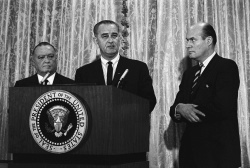 President Lyndon B. Johnson announcing the capture of Ku Klux Klan members suspected of murdering civil rights worker in Alabama
President Lyndon B. Johnson announcing the capture of Ku Klux Klan members suspected of murdering civil rights worker in Alabamacredit: Yoichi Okamoto
On this day in 1965, President Johnson called for a full investigation of the Ku Klux Klan. He announced the arrest of four Klansmen for the murder of Mrs. Viola Gregg Liuzzo of Detroit, Michigan, a White civil rights worker who had been shot to death near Selma, Alabama, on March 25th. In a televised report to the nation, Johnson stigmatized the KKK as “a hooded society of bigots” and warned members to “get out of the Ku Klux Klan and return to a decent society before it is too late.”
On this day in 1968, President Johnson said solutions to racial problems should begin in the South. He spoke to the Christian Citizenship Seminar of Southern Baptist Leaders in the Rose Garden of the White House, saying that there is no Southern problem and no Northern problem, but only an American problem.
"But because so much of that American problem began in the region which you and I call home, I would like to see the solutions begin there, too."
On this day in 1965, President Johnson had a telephone conversation with FBI Director J. Edgar Hoover. Hoover updated LBJ on the progress of the investigation of the murder of Viola Liuzzo and the possible arrest of suspects; they spoke of a call from Anthony Liuzzo to LBJ and FBI informants in the KKK; and Hoover discussed the FBI investigation into the murder of three civil rights workers in Mississippi in 1964.
March 27th
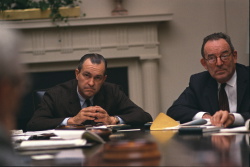 CIA Director Richard Helms and Amb. Walworth Barbour at meeting in the Cabinet Room
CIA Director Richard Helms and Amb. Walworth Barbour at meeting in the Cabinet Roomcredit: Yoichi Okamoto
On this day in 1968, President Johnson held a National Security Council meeting regarding Vietnam. He also met with CIA directors Richard Helm and Ambassador Walworth Barbour.
On this day in 1968, President Johnson met with President William V. S. Tubman of Liberia at the White House. That evening, Duke Ellington performed at the White House State Dinner.
On this day in 1968, President Johnson signed the Jury Selection and Service Act of 1968. LBJ said,
“So, the bill that I will sign shortly takes a principle and makes it into a statute. From now on, all of our Federal juries in this country will be, in the language of the law, ‘selected at random from a fair cross section of the community.’
“This measure reinforces the precious legal rights of all of our citizens, and it does more than that alone; It advances the civil rights of those who still reach for their full and, what we believe, their proper place in our society.”
March 28th
On this day in 1966, President Johnson made remarks of welcome to Prime Minister Indira Gandhi at the White House. That evening, Isaac Stern performed at the White House State Dinner.
“I look forward to getting your thoughts, Madame Prime Minister, on how peace can be obtained or made more secure—in Asia and throughout the world. I shall seek your counsel on the problems of Southeast Asia where India, under the Geneva Accords, has for so long played such a special role.
“I will speak of my deep desire, which I know you share, for the continued improvement in relations between India and her great sister nation, Pakistan. The United States values deeply the friendship of both India and Pakistan. Nothing, we know, is more painful or more costly to all concerned than a falling out between one’s friends.
“I shall look forward, Mrs. Gandhi, to getting a better understanding of the urgent economic and social problems with which your Government is now concerned. I will welcome that frankness and candor and detail that always mark conversations between good friends.
“Economic stability and political tranquility depend on how well we accomplish commonplace tasks: the production of food, its transportation, the supply of fertilizer, family planning, electricity for farm and village, the realization of economic growth and opportunity.
“We shall be concerned with these essentials. The solution of these problems lies, we know, with the Indian Government, but the United States believes in backing the efforts of those who are determined to solve their own problems. We know, Madam Prime Minister, that India under your leadership will have such determination.
“We want to learn how we can best help you and how our help can be used to the very best effect. Your people and ours share the conviction that, however difficult the problems, there are none that a strong and a vigorous democracy cannot solve.
“You have long been aware, Madam Prime Minister, of the fascination that Indian culture holds for Americans. This extends from the Hindu epics to the modern Indian novelists, and from the painters of the Ajanta Cave and the Ak Bar Court to your brilliant film producers of the present day. I venture to think that there is much about the United States that your students find equally interesting. Before our conversations end, I hope to be able to announce an imaginative new step to encourage and to facilitate these common interests.”
On this day in 1967, President Johnson met with Prime Minister Maiwandwal of Afghanistan at the White House.
On this day in 1966, President Johnson signed a Bill to abolish the Postal Savings System. LBJ stated,
“I sign this bill with the assurance that no postal worker will be adversely affected.
“I also sign it with the assurance that no American saver will be inconvenienced. For those who would still like to deposit their savings with the United States Government, I can think of no better way to do so than through United States savings bonds. With the increase in interest that I announced just last month, these bonds will be giving more than twice the interest of the Postal Savings System.”
On this day in 1965, President Johnson made a statement on Federal Employment of Mentally Retarded Persons.
OVER a year ago, in January 1964, we inaugurated a program to open routine jobs in the Federal Government to mentally retarded but occupationally qualified persons. Our hope and intent was to demonstrate the useful potential of individuals suffering mental as well as physical handicaps without creating extra jobs especially for such persons—and without compromising the quality or efficiency of the Federal work force.
Chairman John Macy of the Civil Service Commission has just reported to me the results of our first full-year effort under this pioneering program. What has been done by the Federal agencies is gratifying, and what has been learned from the program is most useful to our further planning.
March 29th
On this day in 1965, there was an Evening of American Indian Art at the White House in honor of the President of the Republic of Upper Volta.
On this day in 1968, President Johnson wrote a letter to the President of the Senate and to the Speaker of the House urging the addition of new areas to the Nation’s Wilderness System. In his letter, LBJ wrote,
There was a day when ‘conservation’ was regarded as an activity far removed from the workaday world of most Americans or work for forest rangers and game wardens. No longer. Many of these areas, as you will note, are close to the centers of American population. They can and will be enjoyed by millions of our people seeking the solitude and splendor of the land as God made it. So they are a trust and a responsibility for all of us.
On this day in 1965, President Johnson met with President Ymogo of Upper Volta at the White House.
March 30th
On this day in 1965, President Johnson gave a statement on the bombing of the U.S. Embassy in Saigon.
THE TERRORIST outrage aimed at the American Embassy in Saigon shows us once again what the struggle in Viet-Nam is about. This wanton act of ruthlessness has brought death and serious injury to innocent Vietnamese citizens in the street as well as to American and Vietnamese personnel on duty. I extend my deepest sympathy to the families of all who lost their lives.
In April, the President transmitted a draft bill to Congress authorizing construction of a new chancery in Saigon.
On this day in 1967, President Johnson signed Executive Order 11340, “Effective Date of Department of Transportation Act.” LBJ stated,
“The Executive order signed today, following months of extensive planning, will bring this vital new Department of Government into operation on Saturday, April 1. It will consolidate 35 programs previously dispersed through 7 departments and independent agencies. It will bring together nearly 100,000 employees and annual expenditures of more than $6 billion…”
March 31st
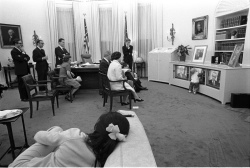 President Lyndon B. Johnson, family members, and staff watching the President's announcement of bombing halt on television
President Lyndon B. Johnson, family members, and staff watching the President's announcement of bombing halt on televisioncredit: Yoichi Okamoto
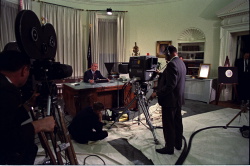 President Lyndon B. Johnson addresses the Nation, announcing a bombing halt in Vietnam and his intention not to run for re-election.
President Lyndon B. Johnson addresses the Nation, announcing a bombing halt in Vietnam and his intention not to run for re-election.credit: Yoichi Okamoto
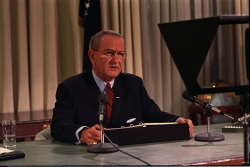 President Lyndon B. Johnson addresses the Nation, announcing a bombing halt in Vietnam and his intention not to run for re-election.
President Lyndon B. Johnson addresses the Nation, announcing a bombing halt in Vietnam and his intention not to run for re-election.credit: Yoichi Okamoto
On this day in 1968, in a nationally televised address, President Johnson stunned the nation by announcing steps to limit the war in Vietnam and that he would not be a candidate for another term as President of the United States.
…
“Fifty-two months and ten days ago, in a moment of tragedy and trauma, the duties of this office fell upon me. I asked then for your help and God’s—that we might continue America on its course, binding up our wounds, healing our history, moving forward in new unity, to clear the American agenda, and to keep the American commitment for all of our people.
“United, we have kept that commitment. United, we have enlarged that commitment.
“Through all time to come, I think America will be a stronger nation, a more just society, and a land of greater opportunity and fulfillment because of what we have all done together in these years of unparalleled achievement.
“Our reward will come in the life of freedom, peace, and hope that our children will enjoy through ages ahead.
“What we won when all of our people united just must not now be lost in suspicion, distrust, selfishness, and politics among any of our people.
“Believing this as I do, I have concluded that I should not permit the Presidency to become involved in the partisan divisions that are developing in this political year.
“With America’s sons in the fields far away, with America’s future under challenge right here at home, with our hopes and the world’s hopes for peace in the balance every day, I do not believe that I should devote an hour or a day of my time to any personal partisan causes or to any duties other than the awesome duties of this office—the Presidency of your country.
“Accordingly, I shall not seek, and I will not accept, the nomination of my party for another term as your President.
“But let men everywhere know, however, that a strong, a confident, and a vigilant America stands ready tonight to seek an honorable peace—and stands ready tonight to defend an honored cause—whatever the price, whatever the burden, whatever the sacrifice that duty may require.
“Thank you for listening.
“Good night and God bless all of you.”
On this day in 1964, the Boston Symphony Orchestra performed a Children’s Concert at the White House.

